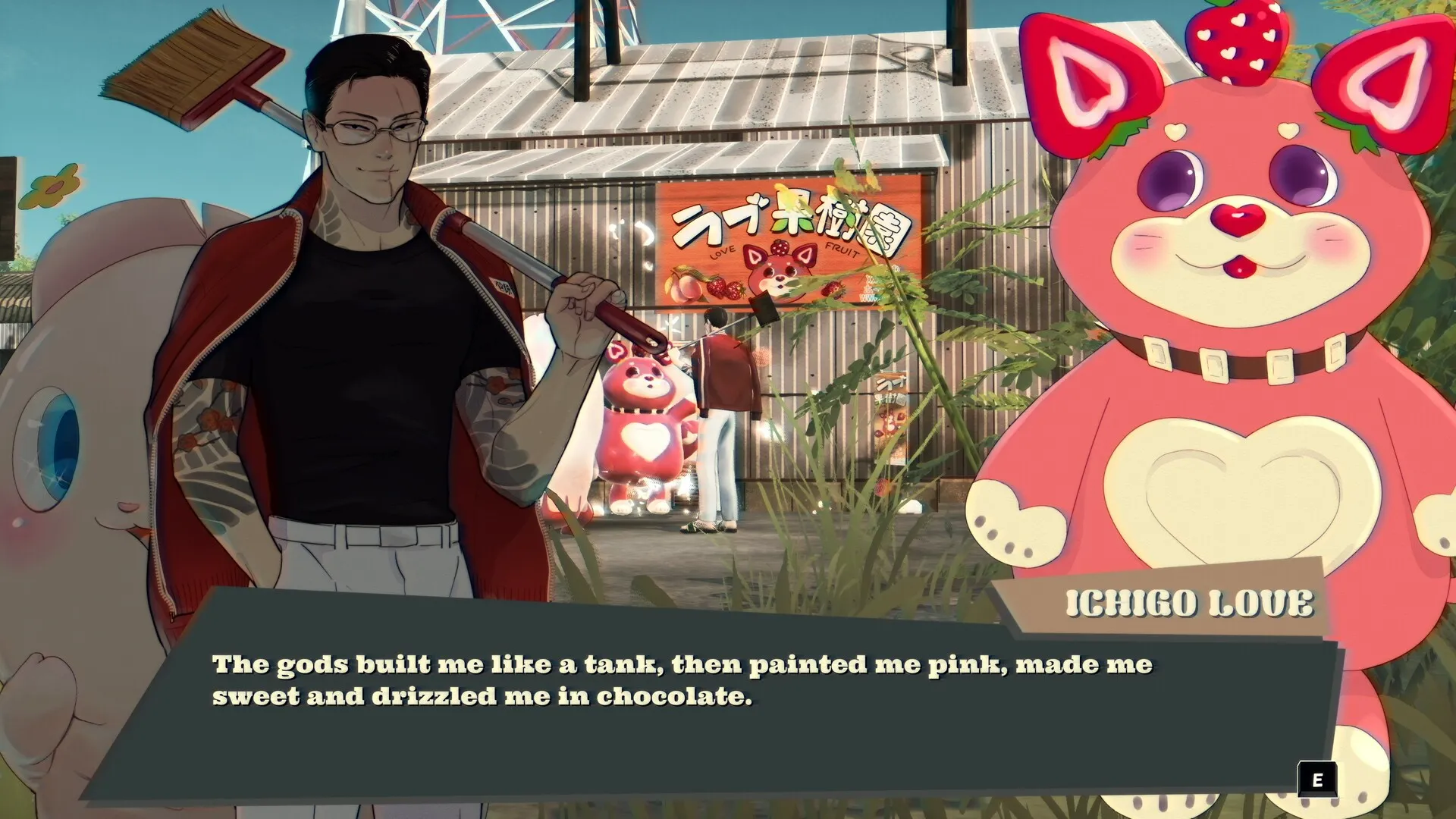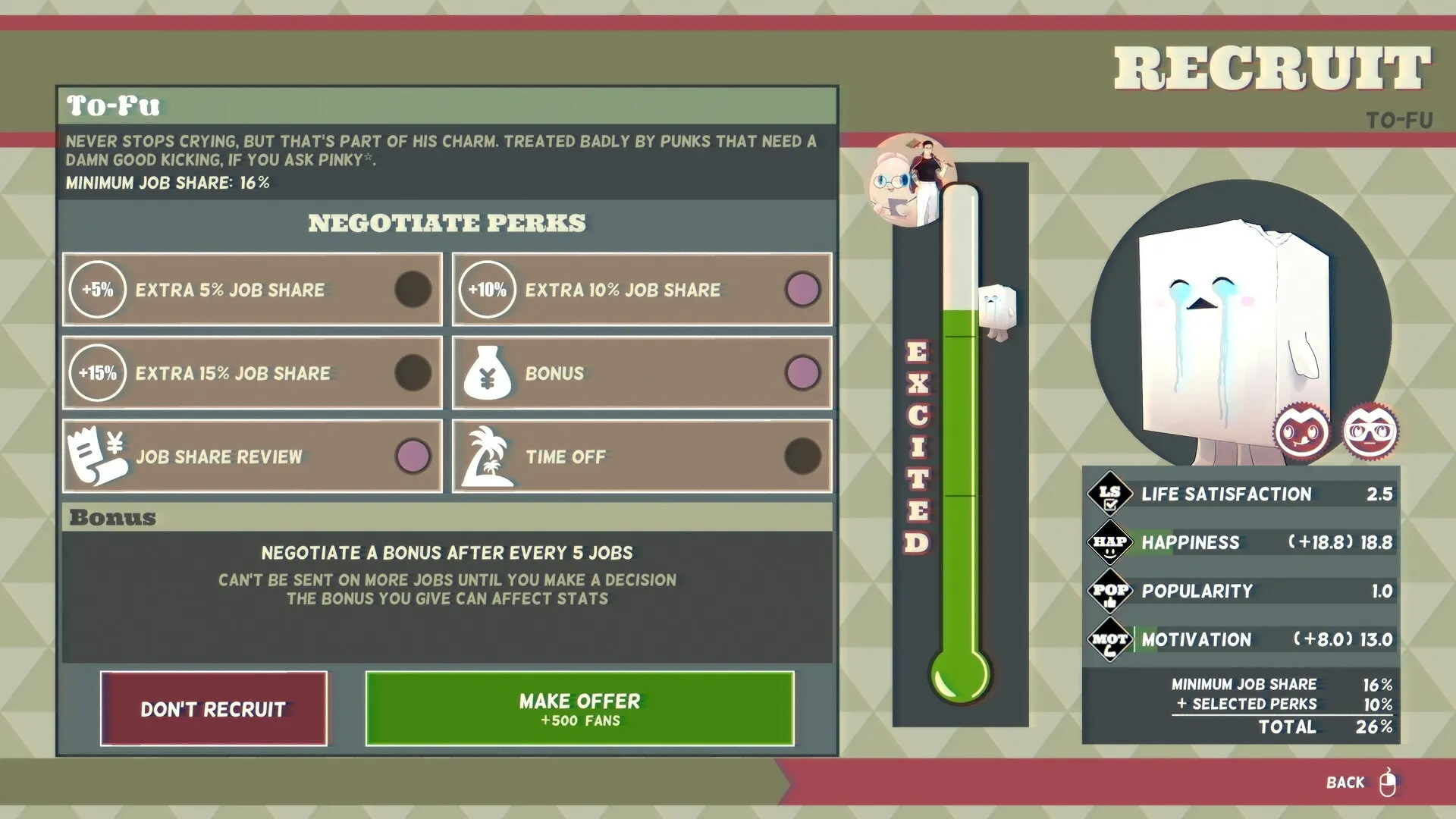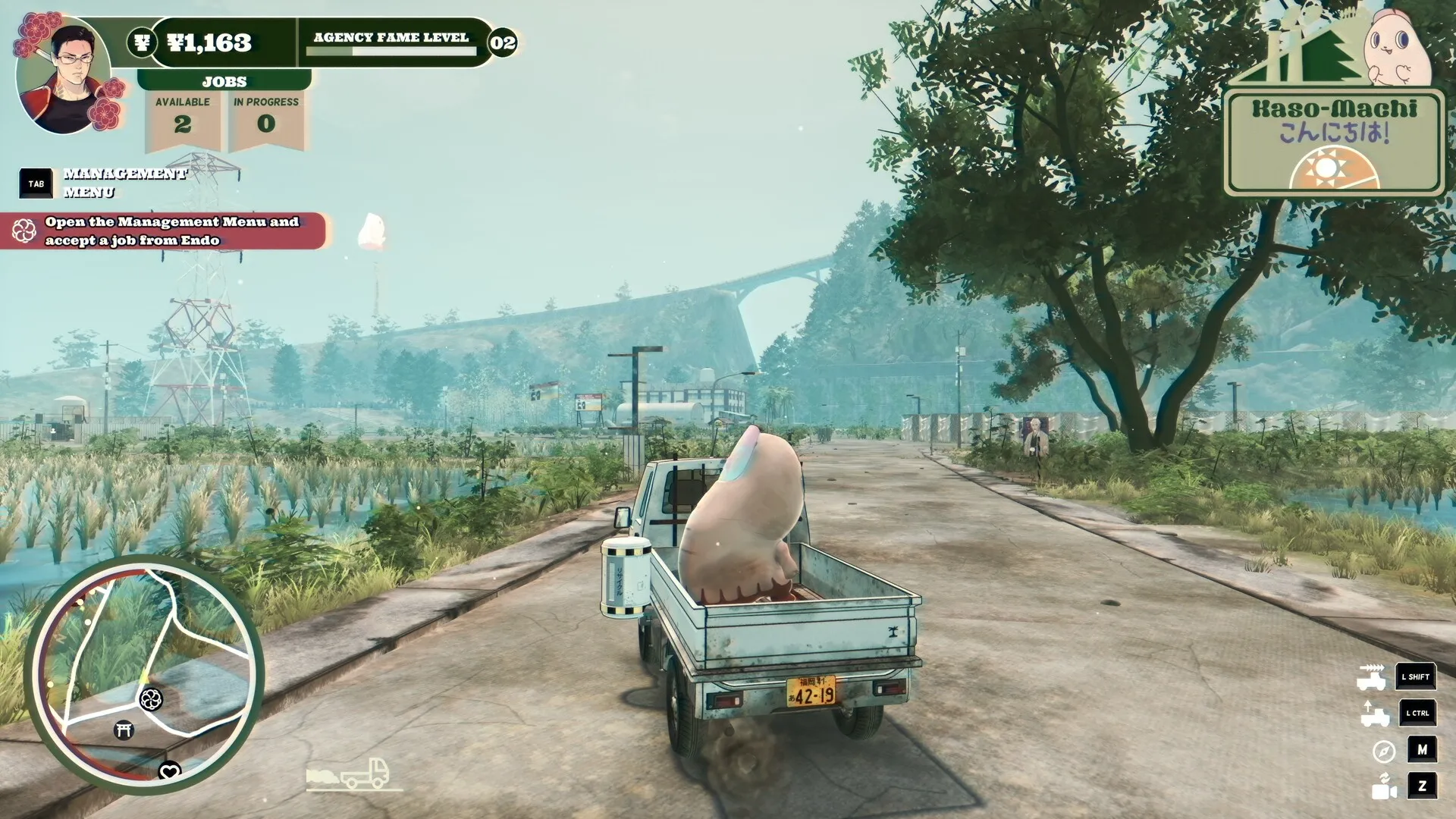Promise Mascot Agency begins by placing you in an environment that hardly resembles a typical town. Here, an exiled yakuza fixer is forced into an unexpected role—running a mascot agency in a town seemingly cursed from within. The setting is full of offbeat humor and a sense of foreboding decay.
You meet characters that seem pulled from a surreal canvas, where even the smallest encounter sparks laughter and unexpected reflection. The story creates a picture of a man thrust into odd circumstances, balancing personal redemption with the everyday absurdities of managing a failing business.
The game mixes different forms of play that rarely appear together. Your role quickly shifts from handling delicate administrative duties to taking control of a vehicle that sometimes acts more like a boat. Meanwhile, short, fast-paced challenges disrupt the calm, requiring you to think quickly during mascot emergencies. This surprising combination of meticulous management and wild, on-the-go adventures gives the experience a flavor all its own.
A careful arrangement of grim realities and cheeky fantasy defines the atmosphere here. The setting is not confined to any one tone but instead presents a layered picture of hardship mixed with unexpected humor. The outcome is a memorable environment that leaves one considering the unpredictable nature of life in a world where even a mascot can change your fate.
Mascots, Mayors, and the Machinery of Debt
Promise Mascot Agency opens with a setup that feels like a joke told too seriously—and that’s where its bite lies. Michi Sugawara, once a cleaner for one of Japan’s major yakuza families, finds himself boxed up and shipped to Kaso-Machi after a botched deal leaves a crater-sized hole in the family finances.
The job? Run a defunct mascot agency, resurrect a dead business, and wire billions of yen back to his boss, all while trying not to die from a supernatural curse targeting yakuza men in the town. It sounds like satire because it is, but that doesn’t mean the emotions underneath are any less sharp.
Michi—tired, unshaven, occasionally philosophical—is a character built on contradiction. He’s a fixer in exile, a criminal with a broom, and a reluctant businessman running community events with a crew of mascots who double as existential punchlines. His closest ally is Pinky, a mascot that happens to be a walking, talking severed little finger. She’s reckless, wired for chaos, and often more yakuza than Michi is allowed to be anymore. Together they push against the town’s decay, occasionally succeeding, more often simply surviving.
The cast sprawls from there. You’ll meet a tofu block with abandonment issues, a funeral urn mascot giving self-funded history tours, and a marina mom who’ll deck a stalker with one swing. These characters aren’t just local flavor—they become plot threads, emergency contacts, and emotional checkpoints. The game treats every resident of Kaso-Machi like a strange but real person, whether they’re running a defunct train station or plotting political revenge through idol merch collection.
Story beats arrive obliquely—via paper trails, midnight phone calls, or whispered rumors from coffee shop regulars. The game doesn’t rush. It lets its narrative accumulate slowly, tying progression to financial milestones and character-driven quests that pull you further into the political and emotional undercurrents of a town eating itself alive.
There’s something disarming about how the game treats its absurdity as infrastructure—deeply rooted, not decoration. In this world, even a severed finger can campaign for mayor. Maybe she should.
Gameplay & Mechanics
Promise Mascot Agency offers a multifaceted system where business management intertwines with action-packed scenarios. In the management simulation, players confront the challenge of balancing a tight budget while assigning mascots to various jobs.
Each mascot comes with its own set of statistics and contractual details, demanding careful adjustments in their benefits packages, profit splits, and bonus triggers. Every decision in these contracts can either prolong the financial hemorrhage or begin the turnaround toward a flourishing empire.
The environment of Kaso-Machi is both a playground and a puzzle. Players use a modified Kei truck, which transforms into a boat when needed, to traverse the town. This vehicle is the gateway to exploring different locations—from decrepit train stations to quirky business fronts. A range of side quests and interactive elements scattered across the map lend texture to the gameplay, offering opportunities to discover hidden challenges and rewards.
Tension escalates when routine operations give way to surprise events. When a mascot encounter spirals unexpectedly, the game shifts into a fast-paced, card-based mini-game. Here, the use of mascot hero cards becomes essential for managing emergencies. Every decision in these moments is pressed with urgency; a slight miscalculation can leave a mascot stranded, impacting both the agency’s reputation and its income. The immediacy of these encounters adds a layer of strategy that requires both quick thinking and prior resource management.
Economic simulation underpins the entire experience, as players start with overwhelming debt and must gradually build up financial reserves. Repeated small wins—successfully completing a contract, managing a crisis, or smartly investing in business expansion—accumulate over time, fostering a sense of gradual achievement. Business expansion is not merely about settling outstanding bills; it extends into subcontracting roles, merchandising ventures, and city-wide advertising, which collectively open new avenues for revenue.
The systems in Promise Mascot Agency evolve as the game progresses. Early tasks feel demanding, with constant pressure to meet deadlines and balance incoming bills. Later, as the mechanics become more interdependent and refined, the challenge shifts towards optimizing strategy. Multiple approaches cater to different styles, whether a player opts for aggressive scaling or a more cautious plan with careful risk management.
Kaso-Machi: A Living, Breathing Town
Kaso-Machi emerges as a place that feels both abandoned and full of untold tales. Wandering through its rundown streets, players encounter the eerie emptiness of decaying infrastructure that whispers of past glories and lingering curses. The town’s terrain shifts from steep mountainous regions to expansive rural farmlands, with hidden pockets of urban decay and weathered ports that suggest a history both troubled and raw.
Local officials seem to have lost control long ago, leaving the town struggling under ineffective management and a sense of neglect. The game portrays a community running on dwindling resources, where local scams and shady dealings mirror financial collapse. It signals issues that stem from deep-rooted mismanagement, yet hints at the possibility of unexpected change sparked by grassroots efforts.
Art direction plays a significant role in building this world. The visual style borrows from Showa-era aesthetics, with a film grain effect that makes the experience feel like stepping into a living movie. Backgrounds are marked by bold contrasts and an assortment of character designs that make each mascot and resident unmistakably human, despite their odd appearances. This style not only underlines the surreal nature of Kaso-Machi but also emphasizes its unexpected warmth amid bleak settings.
Even minor characters, such as a tearful block of tofu or a determined feline in formal attire, enrich the landscape. Graffiti on crumbling walls, unusual signs, and scattered collectibles give clues about the town’s long-forgotten history. Every corner of Kaso-Machi hints at a story waiting to be uncovered, offering layers of detail that reward exploration and provoke thought about the fragile nature of community and resilience.
Audio & Visual Presentation: Crafting a World of Sound and Vision
The game’s soundtrack sets a lively tone throughout each scene, blending a mix of energetic tracks with quieter, reflective pieces that match the fluctuating pace of gameplay. During moments of tactical decision-making in the mini-games, the music pulses with urgency, while cruising through the decaying yet quirky town reveals softer, introspective melodies. This dynamic score adds an emotional layer that underpins both hectic and calm periods of play.
Voice acting stands out with top-notch Japanese talent. The vocal performances capture a broad range of moods—from the weight of past misdeeds to the snarky humor of everyday absurdities in Kaso-Machi. Each character’s vocal delivery helps to flesh out their personality and reinforce the game’s offbeat narrative.
Visual design complements the audio with a film grain effect that calls back to Showa-era Japanese cinema, lending a nostalgic touch. Detailed environments combine decay and surreal elements; backgrounds are balanced by caricature-like character models.
The careful integration of these visual and auditory aspects creates a cohesive atmosphere where every audio cue and visual detail works to enhance the storytelling. This approach invites players to experience a game world where every scene speaks volumes without a single word.
Game Systems & Progression: Economic Strategies and Growth
Promise Mascot Agency builds its core experience around managing finances and keeping the operations afloat amid overwhelming debt. Players are tasked with balancing income against relentless bills and repayments, which mirrors the everyday struggles of running a business under pressure.
Every decision about spending, saving, or expanding affects the financial flow throughout the game. For example, carefully choosing when to upgrade basic facilities or invest in new revenue streams plays a critical role in progressing from a struggling agency to one that becomes a thriving enterprise.
Facility upgrades offer tangible benefits that impact both gameplay and story development. Improving the “sex hotel” headquarters or opening additional advertising channels not only makes operations run smoother but also ties directly into narrative progression, as each improvement brings the town closer to a revitalized state. Incremental improvements deliver a sense of steady reward for smart resource allocation, making every financial decision feel significant.
Recruitment of new mascots is handled with an eye on negotiation and character growth. Contracts with mascots involve detailed terms about benefit packages and bonus triggers, which in turn influence their performance during missions. Repeated success in jobs and the tactical deployment of mascot hero cards allow these characters to gain better stats over time, deepening the sense of connection between management and character development.
Side quests and collectible challenges create additional layers to gameplay. Mini-games, such as claw machine challenges, and varied tasks scattered around the map keep the routine of managing contracts fresh and unpredictable. These moments break up the routine and offer opportunities to adjust strategies on the fly.
The game’s open-ended mechanics introduce variability with each playthrough. Choices in resource management and risk evaluation lead to outcomes that differ every time, granting a satisfying depth that encourages repeated exploration of its economic and strategic systems.
The Review
Promise Mascot Agency
Promise Mascot Agency delivers a memorable experience through inventive gameplay, striking visuals, and an offbeat narrative that hooks you from the start. The intricate management systems and unexpected cinematic moments create a game that rewards persistence and smart planning.
PROS
- Innovative blend of gameplay styles
- Distinctive visual style and atmosphere
- Deep, engaging narrative with memorable characters
- Challenging economic and resource management systems
- High replay value with open-ended mechanics
CONS
- Steep learning curve for new players
- Occasional imbalance in mini-game difficulty
- Some narrative beats may feel disjointed to casual players




















































